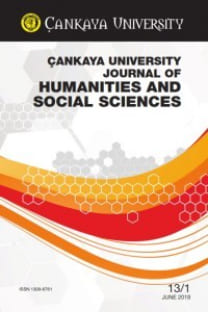Doris Lessing’in The Golden Notebook ve The Diary of a Good Neigbour Adlı Romanlarında Diyalojik Benliğe Yolculuk
Doris Lessing, Mikhail M. Bakhtin, dialogic principle, self
The Journey to Dialogic Self in Doris Lessing’s The Golden Notebook and The Diary of a Good Neighbour
Doris Lessing, Mikhail M. Bakhtin, dialogic principle, self,
___
- Bakhtin, M. M., Holquist, M., and Liapunov, V. (1990). Art and answerability: Early philosophical essays (Vol. 9). University of Texas Press. Original work published in 1919.
- Bakhtin, M. M. (1984). The dialogic imagination: Four essays. University of Texas Press.
- Bakhtin, M. M. (1986a). “Response to a question from the Novy Mir editorial staff.” Speech genres and other late essays, 1-9. Original work published in 1979.
- Bakhtin, M. (1986b). Toward a methodology for the human Sciences: Speech genres and Other late essays, translated by Vern W. Original work published in 1979.
- Barnes, S. (2015). “So why write novels?” The golden notebook, Mikhail Bakhtin, and the politics of authorship. Doris Lessing’s The Golden Notebook After Fifty, 135-152.
- Bialostosky, D. (2016). Mikhail Bakhtin: Rhetoric, poetics, dialogics, rhetoricality. Parlor Press LLC.
- Holquist, M. (2002). Dialogism: Bakhtin and his world. Psychology Press.
- Knapp, M. (1984). Doris Lessing. New York: Frederick Ungar Publishing Company.
- Lessing, D. (1983). The diary of a good neighbour. Alfred A. Knopf Incorporated.
- Lessing, D. (1999). The golden notebook. Harper Perennial.
- Morson, G. S., and Emerson, C. (1990). Mikhail Bakhtin: Creation of a prosaics. Stanford University Press.
- Pickard, S. (2021). Ageism, existential and ontological: Reviewing approaches toward the abject with the help of Millett, Hodgman, Lessing, and Roth. University of Toronto Quarterly, 90(2), 111-126.
- Simpson, P. (2003). Language, ideology and point of view. Routledge.
- Voloshinov, V. N., and Bachtin, M. M. (1986). Marxism and the philosophy of language. Harvard University Press. Original work published in 1929.
- Waxman, B. F. (1985). From “Bildungsroman" To "Reifungsroman": Aging in Doris Lessing's fiction. Soundings, 318-334.
- Waxman, B. F. (1990). From the hearth to the open road: A feminist study of aging in contemporary literature. Praeger.
- ISSN: 1309-6761
- Yayın Aralığı: Yılda 2 Sayı
- Başlangıç: 2004
- Yayıncı: Çankaya Üniversitesi
Adrienne Kennedy'nin Funnyhouse of a Negro ve The Owl Answers adlı Oyunlarında Kesişen Sınırlar
Book Review: Wonder Tales in the Fiction of A. S. Byatt. Ed. by Alexandra Cheira
Ütopya ve Distopyanın Diyalektik Anlayışı Perspektifinden Edward Bond’un Diyalektik Tiyatrosu
John Clare’in Tımarhane Şiirlerinde Ev Düşüncesi ve Bellek
Direnişi Arşivlemek: Distopya Yazınında Hafıza ve Muhalif Kayıtlar
Book Review: It’s A Stray Dog’s Life by Maximillian Sam
Rabbit Hole ve Clybourne Park’ta Ev Alanı ve Yeni Aile Kavramları
